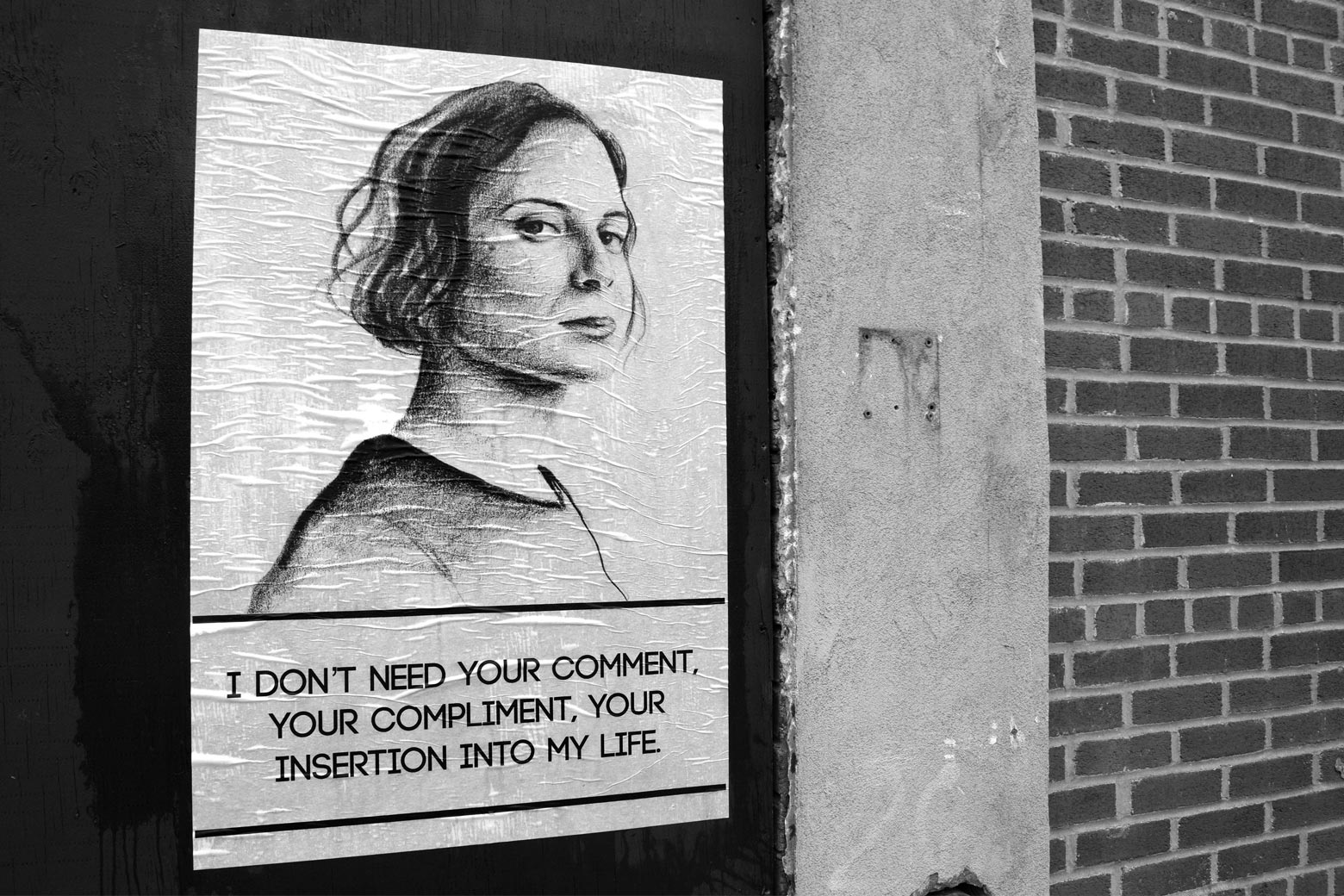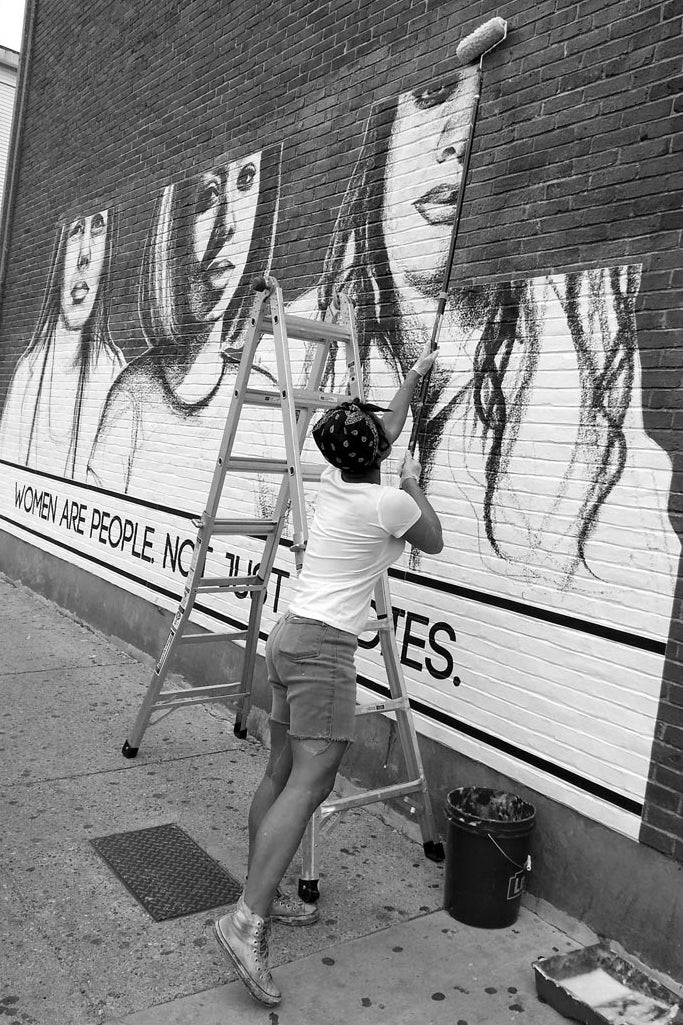On this week’s episode of The Waves, Marcia Chatelain, Nichole Perkins, and June Thomas were joined by artist and author Tatyana Fazlalizadeh, whose work was featured in Season 1 of Netflix’s She’s Gotta Have It, where the story of lead character Nola Darling’s creation of large-scale posters to confront street harassers was based on an art project that Fazlalizadeh started in 2012. That work forms the basis of her new book Stop Telling Women to Smile. This transcript of their conversation has been edited and condensed for clarity.
June Thomas: How did you develop the artistic style of your anti-street-harassment posters?
Fazlalizadeh: The work features black-and-white portraits of women and non-binary femmes done with graphite pencil on paper. I do them very simply in my sketchbook. I then scan them and blow them up really large to put out in the street. Along with the portraits is text, which speaks directly to harassers. In the conversation I have with a woman, I ask her very directly, “What do you want to say to harassers in the street?” Usually the text comes from that.
When I decided to create a project that was going to be out in the street, I thought a lot about just using text or using photographs, but I really wanted to keep that hand-drawn, hand-created portrait element. I also really love the idea of these black-and-white images on outdoor walls, which are usually colored and have texture.

Thomas: There’s something really striking about the way that you present your subjects. We’re used to seeing women smiling in portraits, and these women are serious. Have you ever gotten pushback about that?
Fazlalizadeh: I have. I’ve done a couple of murals through the project, and I’ve had people say: “They should be smiling. Why aren’t the women smiling? Why do they look so mean?” I think you’re right. We are used to seeing women, especially women in public and the media, even in art, with smiling or inviting faces. And I didn’t want that. When I ask women to pose for these images, I tell them look at me and look at the camera as if you were looking at your harassers, tell me what you want to say to your harassers. I want you to look at the camera as if you were speaking to them. I want them to look as if they are people on the street who are speaking back to the people who harass them. And I also want them to look very regular. I don’t ask them to dress up. I want these to be images of regular, everyday folks who are out in the street and have something to say about being out in the streets.
Marcia Chatelain: I really enjoyed reading the book. I thought it was interesting on how harassment plays out in different physical spaces, the way that car culture and condensed urban environments yield different experiences, but there’s still that through line that no matter where you’re living, harassment is a shared experience. In your time interviewing women about street harassment, how do you grapple with the weight of the memories? I appreciated that people were so open and honest about how their first encounter with harassment changed them.
Fazlalizadeh: It does change you. And it happens so young. Something I found interesting over all the conversations was that it started in our youth. The conversations I have with women are very open, very candid, honest conversations. At this point, I’m creating a space where people are able to talk about something that can be very traumatizing and happens to us so often. But we don’t often have these in-person spaces to talk about it. So what I noticed is that the folks who come to me and participate in the work are just so open because it is a cathartic space to be in, to be able to talk with someone who empathizes with you, who understands what you’re going through and is also really interested in simply hearing you and listening to you.
So often when we talk about our experiences with sexual harassment, we’re not believed or we’re trying to find some type of validation. So to be able to be in conversation with someone and for me to be able to create a space where women are heard and listened to and believed is great for both people participating in the conversation.
Nichole Perkins: One of the things that stands out to me is the way that the posters seem to have become living art, because people write on the posters and talk back to the statements that are on them, or sometimes they try to confront the message of the poster. It becomes a dialogue among strangers on the art itself. What have these “conversations” shown you about the project?
Fazlalizadeh: Well, it’s taught me that it’s having a real effect on people. People are responding to the work and not just online or on social media. To have it happen “in person” shows me that it’s having an effect in the space that I want it to have an effect on. That’s why the work is out in the street. I want people to see them, to respond to them, to have some reaction to them, to hopefully consider them in a way that makes people change their behavior and treat women better in the street.
A lot of times what will happen is someone will deface a poster by crossing out words or scratching out words or trying to change the message or eliminate and erase the message of it. So someone else will come back and rewrite the word, they’ll put it back in there. I always find it very interesting that people are behind the work in such a way that they follow it–they’re defending it in the street.
The first time that it happened, I was taken aback. I didn’t like it. I felt, someone’s writing on my artwork, but then I realized that once it’s out in the street, it becomes a part of the world in that way. It’s open to everything. It’s open to weather, it’s open to people writing on it, it’s open to anything happening to it. So now I’ve come to expect it, it’s just a part of the life of the work. It’s just something that’s going to happen.
To listen to the full episode of The Waves, in which Christina Cauterucci, Chatelain, Perkins, and Thomas also discussed the Harvey Weinstein verdict and the Netflix dating show Love Is Blind, click the player below or subscribe wherever you get your podcasts.
